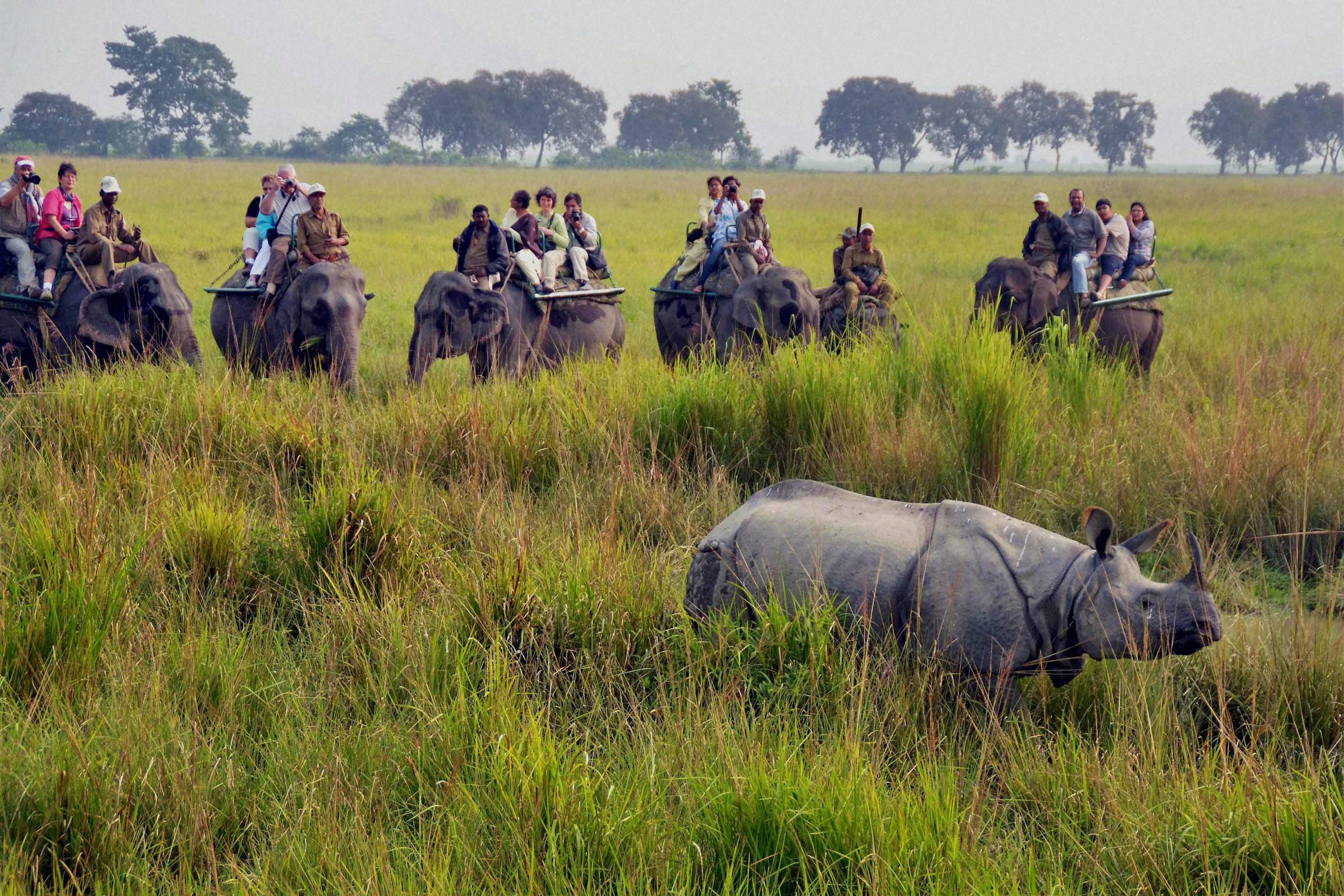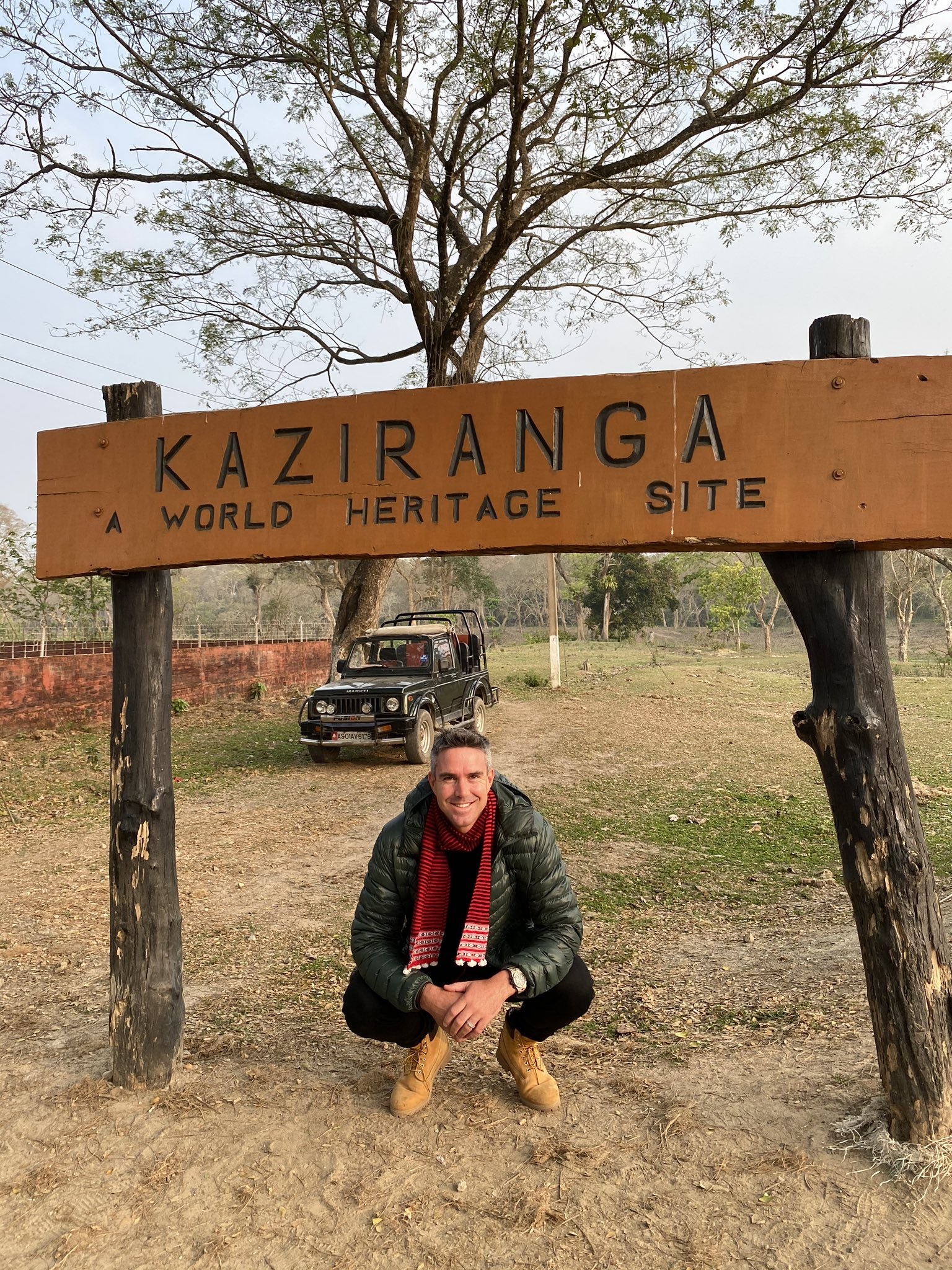
A decomposed carcass of a fully-grown (around 30 years old) female rhino in the world-famous forest reserve was recovered recently. As apprehended, the precious horn was missing, for which the gigantic animal was apparently hunted down, reports Nava Thakuria
With one solitary incident of poaching of endangered one-horned rhinoceros at Kaziranga National Park & Tiger Reserve in Assam of northeast India last year, bad news broke in the first month of 2022, as the forest authority recovered the decomposed carcass of a
full-grown (around 30 years old) female rhino in the world-famous forest reserve recently. As apprehended the precious horn was missing, for which the gigantic animal was seemingly hunted some days back.
It was a little ironic that only some hours back, cricket commentator and conservationist Kevin Pietersen appreciated Prime Minister Narendra Modi-led Union government in New Delhi on reduction of incidents related to rhino poaching. ‘Bravo Narendra Modi and bravo to all the men and women who sacrifice their lives in protecting the animals in India too. I’ve met lots of them and I respect you immensely!’ said Pietersen.
The South Africa born British celebrity responded to an input by a newsweekly on 18 January, which quoted Assam’s anti-rhino poaching task force chief GP Singh, who made the claim on 15 January that only one incident of rhino poaching had taken place in April 2021 till date. The special Assam police chief termed the containment of poaching of one-horned rhinos as a major achievement of the task force constituted by the State government in Dispur appreciating the team work shown by various concerned district police forces. Assam chief minister Himanta Biswa Sarma promptly responded to Pietersen in the digital platform on 19 January itself thanking for the acknowledgement. ‘Inspired by our PM Narendra Modi, we’ve launched aggressive programs to curb poaching. We’re proud to have burnt & destroyed a stockpile of rhino horns, largest ever in the world, on World Rhino Day to send a stern message to poachers & syndicate,’ tweeted Sarma.

Statistics reveal that Assam, which claims a success story for conserving two thirds of world one-horned rhino population, has lately reduced the number of rhinos related poaching in the last few years, where it was lowest during 2021 in the last two decades. Two previous years witnessed only five incidents of rhino-poaching in Kaziranga and other protected reserves of Assam, where two rhinos were poached in 2020 (three in 2019). It was relatively larger in number during 2018 (6 killed), followed by 2017 (7), 2016 (12), 2015 (17), 2014 (27), 2013 (27), etc.
Presently spreading across over 800 square kilometre on the south bank of mighty river Brahmaputra and classified as a UNESCO world heritage site, Kaziranga alone gives shelter to 2,413 single horn rhinos (as estimated by the 2018 rhino census). Known as a safe haven for greater one-horned rhinoceros, the forest reserve also gives shelter to over 150 Royal Bengal tigers & around 250 leopards, over 5500 Asiatic elephants, a sizable number of buffalos, different species of deer, birds, fishes, etc.
Besides Kaziranga, other forest Assam reserves namely Pabitora Wildlife Sanctuary (around 100 rhinos), Orang National Park (100) and Manas National Park (45) support the rhino population to make a total count for Assam of over 2650 living rhinos. The authority expected to increase the rhino population up to 3,000 in Assam by the end of 2020, but it is yet to be fulfilled. Native to the Indian subcontinent, one-horned rhino (also known as
rinoceros unicorns or great Indian rhinoceros) is one of the worst affected rhino species. The reason behind the poaching of rhinos is tempted by the high demand for horns in Asian countries where many people believe it, often termed as black ivory, to be a natural
Viagra. A matured horn may fetch a huge sum of money in the international market feeding the demand in various countries including China.
The animal enjoys great sexual power, as its mating time may continue for around 45 minutes (quite higher than any other animal). So many people unscientifically believe that one can achieve the unusual sexual power with the help of rhino horns (using as traditional Viagra). Moreover, the horns are believed to have some medicinal value as the traditional Chinese medicine requires rhino horns that are supposed to cure high fever, stomach ailments and even cancer. Taiwan, Thailand, South Korea, Vietnam and the Middle East are also known to be huge markets for the horns, where the use of horns for medical purposes and scientific research are legalised. But veterinarians argue that the rhino horns comprise the same protein that constitutes the formation of hair and it cannot have any such medicinal value.
“Saving the rhinos from the eye of the poachers becomes possible by the continuous efforts made by the wildlife conservationists and forest officials working round the clock to protect the wildlife. Even though there is a decline in the poaching of rhinos, termed as the
pride of Assam, the poachers would look for opportunities to kill the rhinos,” said a forest officer adding that the efforts in protecting the rhinos from poachers must be maintained.
Rhinos are recognized as vulnerable by the International Union for Conservation of Nature and India’s wildlife protection act gives enormous power to the rangers for protecting the grass-eating pachyderm. On 22 September 2021, Assam government set 2479 confiscated
rhino horns from poachers over the past four decades on fire with an aim to spread the message that rhino horns don’t have any aphrodisiac quality. With the first of its kind events to destroy rhino horns on such a large scale, the authority intends to send a strong message against the poaching of wildlife including rhinos.
Armed with modern and sophisticated weapons, the Kaziranga guards were lately equipped with satellite phones to maintain a strong network where the commercial mobile connectivity is relatively poor. Assam’s top government officer Jishnu Baruah handed over 10 such devices to the park authorities. Amidst all precautions, the last poaching incident will definitely raise questions about the protection measures adopted by the authority.












